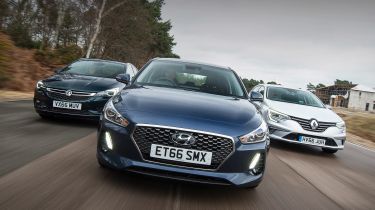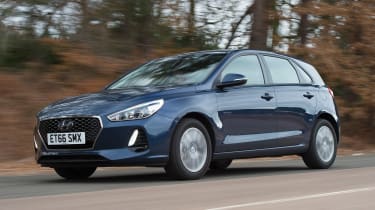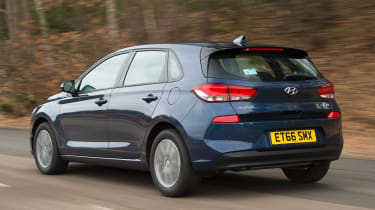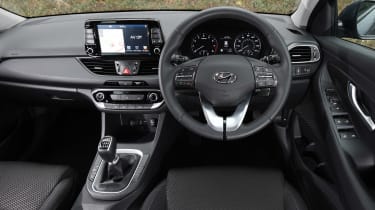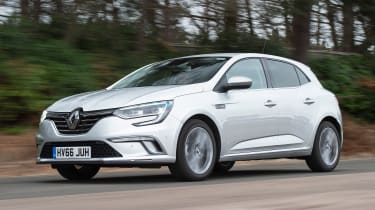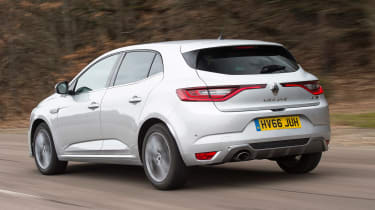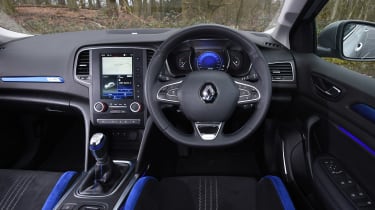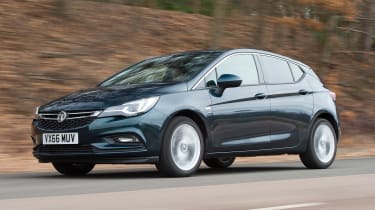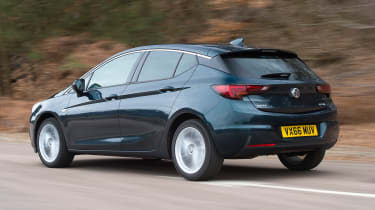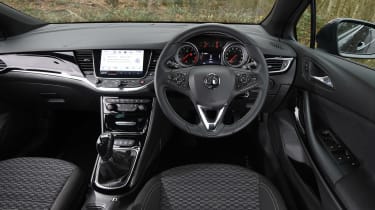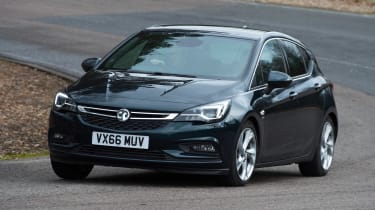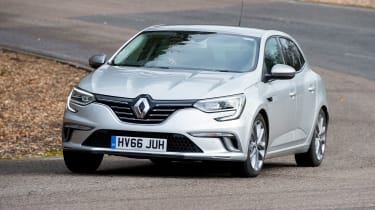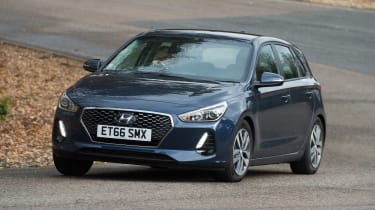Hyundai i30 vs Renault Megane vs Vauxhall Astra
Hyundai’s new i30 faces the Vauxhall Astra and Renault Megane in a three-cylinder turbo hatch battle
Diesel sales are on the wane, thanks to worries about emissions, while the latest petrol engines are catching up with them for efficiency.
Manufacturers such as Hyundai are hoping to cash in on this renewed interest in petrol power, and the new i30 five-door is just the model to do it with. Hyundai is rolling out its downsized 1.0 T-GDi three-cylinder turbo petrol engine across its range, and the new i30 is the latest car to get it.
The last i30 really moved things on for Hyundai, with decent quality, a practical interior and prices that were competitive with mainstream rivals’.
The Mk3 builds on those foundations, but there are plenty of adversaries to choose from, and the latest model faces two of the best here. The Renault Megane TCe boasts a more powerful engine and greater space than the i30, while the Vauxhall Astra 1.0i Turbo has price and efficiency on its side. The Astra came out on top in our last downsized turbo petrol shootout, so will it reign once again, or can the new Hyundai come out on top?
Hyundai i30
| Model: | Hyundai i30 1.0 T-GDi 120 SE Nav |
| Price: | £19,645 |
| Engine: | 1.0-litre 3cyl turbo, 118bhp |
| 0-60mph: | 10.2 seconds |
| Test economy: | 37.9mpg/8.3mpl |
| CO2: | 115g/km |
| Annual road tax: | £30 |
Despite the rise in popularity of the crossover, the five-door hatchback is still a staple of the UK best-seller list. Hyundai is hoping that its new i30 can rise to the top of the class. Here we test the SE Nav model with the 1.0 T-GDi 120 engine to see if it can knock the Astra off its perch.
Used - available now
That restrained feel continues under the skin, because the i30 is very refined. At idle it’s only possible to detect a faint hum from the 1.0-litre three-cylinder engine. However, it does get noisier when you pull away.
• Best hatchbacks on sale right now
With 118bhp and 171Nm of torque, performance is good, and the i30 matched the more powerful and torquier Megane from 0-60mph, taking 10.2 seconds; it can thank the relatively low kerbweight for that. However, it wasn’t quite as strong in gear, taking 12.6 seconds to accelerate between 50 and 70mph in sixth, which was one second slower than the Renault. Performance isn’t bad, though.
What’s more important with hatchbacks like this is ride quality. The i30 deals well with rough roads up to a point, beyond which the suspension starts to struggle, despite that more sophisticated rear axle, and there’s a noticeable level of body movement that can be felt from the cabin.
Apart from this, the i30 is a comfortable cruiser, with enough wheel control to smother most surface imperfections and keep things calm for passengers. The downside is that the Hyundai doesn’t sparkle all that much dynamically. There’s plenty of grip, but you wouldn’t know it through the steering. While Hyundai has dropped its largely ineffective FlexSteer power-assistance system, the wheel still feels lifeless, with a constant weight no matter what speed you’re doing or how much lock you add. The wheel feels inert as a result, although the punchy engine and fairly positive six-speed manual go some way to rescuing the driving experience.
Testers' notes: “The 1.0 T-GDi engine will be cheaper to run than the 1.4 turbo, but without too much of a performance sacrifice. It’s not available with Hyundai’s seven-speed DCT auto, though.”
Renault Megane
| Model: | Renault Megane TCe 130 GT Line Nav |
| Price: | £20,250 |
| Engine: | 1.2-litre 4cyl turbo, 128bhp |
| 0-60mph: | 10.2 seconds |
| Test economy: | 33.9mpg/7.5mpl |
| CO2: | 120g/km |
| Annual road tax: | £30 |
On the face of things, the Renault Megane offers slick design and lots of tech, while the 1.2 TCe turbo petrol serves up the strongest figures on paper. In £20,250 GT Line Nav trim it comes with some sportier styling cues, but this doesn’t change the way the car drives, so the basic recipe is the same as the i30. Is it a better family hatch, though?
The Megane has a more powerful 128bhp engine than the i30, but it also weighs 146kg more than the Hyundai, which explains why their 0-60mph sprint times were identical. However, the Renault’s healthy 205Nm torque output meant it was quicker than both of its rivals in gear.
You have to work the engine quite hard to get maximum performance, though, as the 1.2 TCe unit feels flatter at low revs compared with the i30 and Astra. The gearshift also isn’t as sweet as its rivals’, but the Renault feels more alive than the Hyundai.
There are different driving modes to choose from, with Sport, Comfort and Eco settings all available, but they don’t alter the character of the car all that much. The steering has a more natural feel and weight than the i30’s, while there’s even more grip available. On our GT Line Nav test car’s standard 17-inch wheels the ride can be a little nobbly, but it smooths out with speed.
The Megane starts to flow more the faster you go, which is a nice trait, and it means motorway journeys and even twisty A and B roads are relatively relaxed, with the car balancing agility and comfort well. However, it doesn’t quite deal with larger bumps around town as well as the Astra.
Testers' notes: “Material quality feels better than in the Hyundai. There are still some hard plastics lower down, but the satin finishers for the vents and centre console give a quality feel.”
Vauxhall Astra
| Model: | Vauxhall Astra 1.0i Turbo SRi Nav |
| Price: | £20,375 |
| Engine: | 1.0-litre 3cyl turbo, 104bhp |
| 0-60mph: | 10.5 seconds |
| Test economy: | 42.1mpg/9.3mpl |
| CO2: | 104g/km |
| Annual road tax: | £20 |
The Astra is our reigning compact family hatch champion. Vauxhall reinvented the car for this seventh generation, and it edged ahead of its rivals in the process. It’s beaten the best in popular diesel form, as well as in 1.0-litre turbo guise so can it keep its hold over the class here, or will the Hyundai show it a clean pair of heels? We test the Astra 1.0i Turbo in £20,375 SRi Nav trim to find out.
The Astra gets a five-speed manual gearbox, rather than the six-speeders in its rivals, so with one fewer ratio to span a similar speed range, the Vauxhall’s performance on test was impressive. The 1.0-litre three-cylinder turbo engine was also the least powerful here, at 104bhp, although it produces a similar 170Nm of torque to the Hyundai’s.
At the track, the Astra accelerated from 0-60mph in 10.5 seconds, and while its in-gear times were slightly slower than both the i30’s and the Mégane’s, the speed the Astra serves up is more than adequate, with decent punch deliveredlower down in the rev range where you want it.
The Vauxhall just about matches its rivals for performance, while it’s at least the equal of the Renault when it comes to ride quality. The Astra floats effectively over the road surface, offering enough compliance to tune out the majority of nasty bumps. And despite the deletion of the Watts link in the rear suspension (it’s difficult to sense the difference on the road), it delivers enough body control in the corners so that the car feels secure and well tied down.
This urges you to push a little harder, as the Vauxhall can easily take the extra speed. It remains comfortable and composed, and by carrying more momentum through bends, the engine’s power deficit isn’t as much of a disadvantage. Dynamically, the Astra is the most complete package. The steering weight is nicely judged and well matched to the gearshift and pedals, making it easy to drive but also surprisingly fun as well.
Testers' notes: “A user-friendly infotainment system is a welcome feature, but parking sensors and climate control are optional; the Megane gets these as standard.”
Verdict
First place: Vauxhall Astra
Thanks to its blend of affordability, low running costs and the best balance of comfort and dynamic ability, the Astra takes victory again. It’s not as practical as the Megane, but it offers enough usability 99 per cent of the time. Quality is good, too, while the Vauxhall will hold on to more of its value, making it the cheapest to buy and run for cash and finance buyers, as well as company car drivers.
Second place: Renault Megane
Space is the Megane’s big plus point, but downsized petrols are all about cost, and compared with the Astra, it’ll be pricier to run. The infotainment system is the most upmarket, but the Renault lacks the Vauxhall’s ride and handling finesse. GT Line wouldn’t be our choice, either. Save some cash on a Dynamique S, while the 1.5 dCi delivers better performance and economy.
Third place: Hyundai i30
The i30 is a nicely refined product, but it doesn’t do anything better than its rivals. It’s not as spacious as the Megane, nor is it as efficient or as good to drive as the Astra, and while there’s some clever tech on offer that’ll make life easier, it doesn’t elevate the i30 to a level beyond its challengers here. It’s spacious, but ultimately a little bland in a sector full of more exciting cars.
Is it worth waiting for this model?
Honda Civic 1.0 Turbo SR
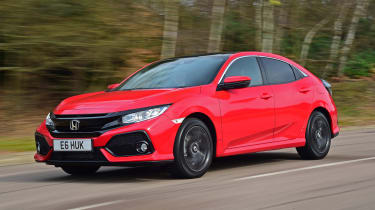
On sale: NowPrice: £20,180Engine: 1.0-litre 3cyl, 127bhp
Honda is finally launching a downsized turbo petrol, and the new Civic will make its debut with this 127bhp three-cylinder engine. We’ve already driven the car abroad and liked the punchy performance and refinement.
Figures
| Vauxhall Astra 1.0i Turbo SRi Nav | Renault Mégane TCe 130 GT Line | Hyundai i30 1.0 T-GDi 120 SE Nav | |
| On the road price/total as tested | £20,375/£21,830 | £20,250/£21,595 | £19,645/£20,230 |
| Residual value (after 3yrs/36,000) | £8,134/39.9% | £7,576/37.4% | £7,074/36.0% |
| Depreciation | £12,241 | £12,674 | £12,571 |
| Annual tax liability std/higher rate | £691/£1,382 | £848/£1,696 | £784/£1,567 |
| Annual fuel cost (12k/20k miles) | £1,557/£2,595 | £1,933/£3,222 | £1,729/£2,882 |
| Ins. group/quote/road tax band/cost | 10/£491/B/£20 | 14/£640/C/£30 | 9/£481/C/£30 |
| Cost of 1st/2nd/3rd service | £583 (3yrs) | £349 (3yrs/30,000) | £349 (3yrs) |
| Length/wheelbase | 4,370/2,662mm | 4,359/2,669mm | 4,340/2,650mm |
| Height/width | 1,485/1,809mm | 1,447/1,814mm | 1,455/1,795mm |
| Engine | 3cyl in-line/999cc | 4cyl in-line/1,198cc | 3cyl in-line/998cc |
| Peak power/revs | 104/5,500 bhp/rpm | 128/5,500 bhp/rpm | 118/6,000 bhp/rpm |
| Peak torque/revs | 170/1,800 Nm/rpm | 205/2,000 Nm/rpm | 171/1,500 Nm/rpm |
| Transmission | 5-spd man/fwd | 6-spd man/fwd | 6-spd man/fwd |
| Fuel tank capacity/spare wheel | 48 litres/repair kit | 47 litres/£100 | 50 litres/space saver |
| Boot capacity (seats up/down) | 370/1,210 litres | 434/1,247 litres | 395/1,301 litres |
| Kerbweight/payload/towing weight | 1,188/592/1,220kg | 1,340/640/1,300kg | 1,194/606/1,200kg |
| Turning circle/drag coefficient | 11.1 metres/0.29Cd | 11.2 metres/N/A | 10.6 metres/N/A |
| Basic warranty/recovery | 3yrs (60,000)/1yr | 4yrs (100,000)/4yrs | 5yrs (unltd)/5yrs |
| Service intervals/UK dealers | 20k miles (1yr)/338 | 18k miles (1yr)/158 | 10k miles (1yr)/173 |
| Driver Power manufacturer/dealer pos | 25th/22nd | 8th/1st | 30th/23rd |
| NCAP: Adult/child/ped./assist/stars | 86/84/83/75/5 | 88/87/71/71/5 | N/A |
| 0-60/30-70mph | 10.5/10.7 secs | 10.2/9.7 secs | 10.2/9.8 secs |
| 30-50mph in 3rd/4th | 5.2/7.6 secs | 4.4/6.5 secs | 4.8/6.6 secs |
| 50-70mph in 5th/6th | 12.5 secs/N/A | 9.6/11.6 secs | 10.0/12.6 secs |
| Top speed/rpm at 70mph | 121mph/2,900rpm | 122mph/2,400rpm | 118mph/2,500rpm |
| Braking 70-0/60-0/30-0mph | 44.0/34.4/9.7m | 50.4/41.6/9.4m | 49.4/33.2/10.3m |
| Noise outside/idle/30/70mph | 62/51/70/74dB | 63/52/67/73dB | 67/51/66/73dB |
| Auto Express economy/range | 42.1/9.3/445 miles | 33.9/7.5/350 miles | 37.9/8.3/417 miles |
| Govt urban/extra-urban/combined | 52.3/70.6/62.8mpg | 42.2/61.4/52.3mpg | 48.7/61.4/56.5mpg |
| Govt urban/extra-urban/combined | 11.5/15.5/13.8mpl | 9.3/13.5/11.5mpl | 10.7/13.5/12.4mpl |
| Actual/claimed CO2/tax bracket | 155/104g/km/17% | 193/120g/km/21% | 172/115g/km/20% |
| Airbags/Isofix/park sensors/camera | Six/y/£460/£615* | Six/yes/yes/£400 | Seven/yes/yes/yes |
| Auto/stability/cruise control/AEB | No/yes/yes/yes | £1,200/y/y/£400^ | No/yes/yes/yes |
| Climate ctrl/leather/heated seats | £405/no/£355 | Yes/no/£1,200** | £1,000^^/no/no |
| Met paint/LED lights/keyless go | £555/£1,250/£405 | £545/£500/yes | £585/£1,000^^/no |
| Sat-nav/USB/DAB/Bluetooth | Yes/yes/yes/yes | Yes/yes/yes/yes | Yes/yes/yes/yes |
